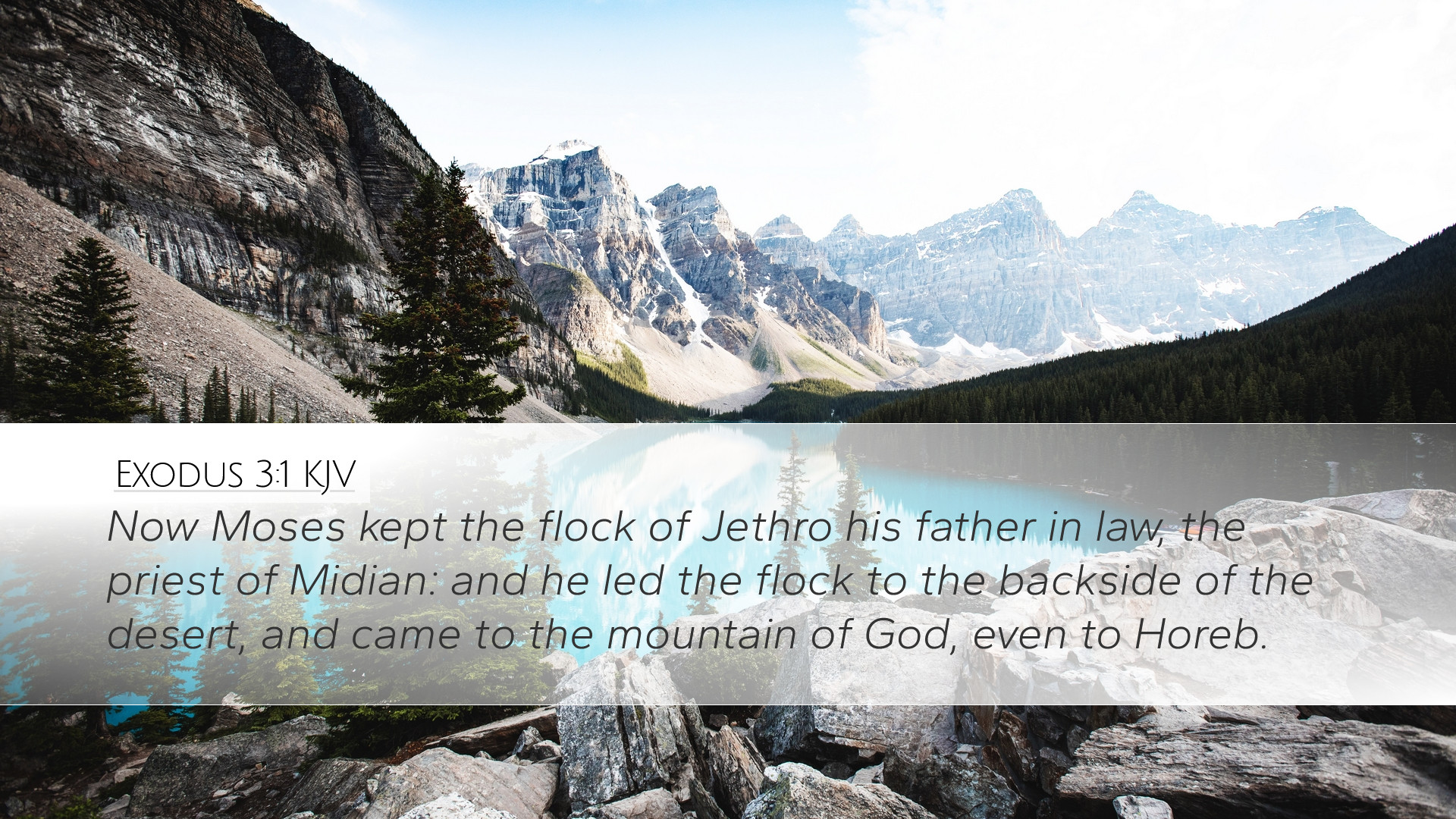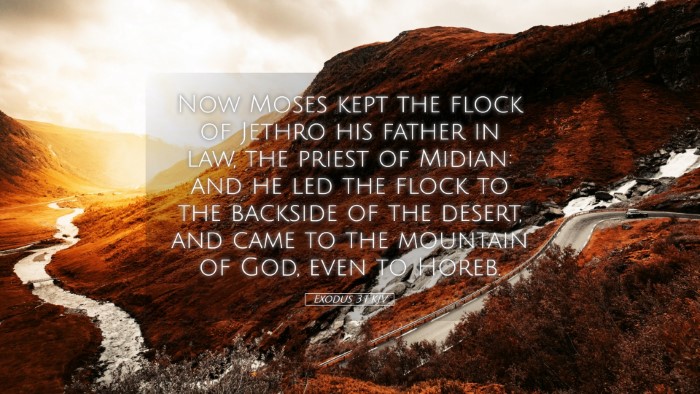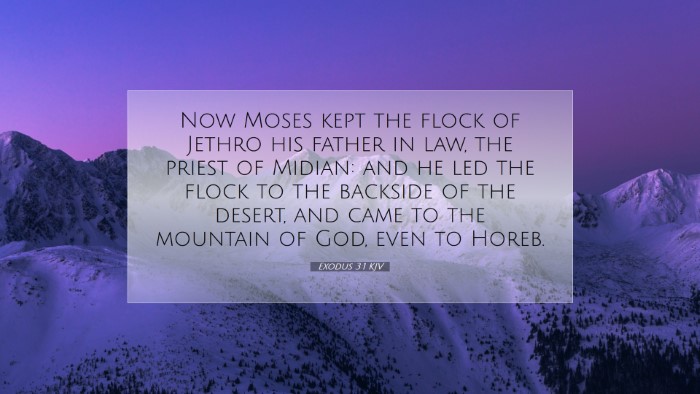Commentary on Exodus 3:1
Verse: "Now Moses kept the flock of Jethro his father-in-law, the priest of Midian: and he led the flock to the backside of the desert, and came to the mountain of God, even to Horeb." (Exodus 3:1)
Introduction
Exodus 3:1 marks a pivotal moment in the life of Moses, serving as the introduction to one of the most significant encounters recorded in Scripture—the burning bush. The details of this verse set the stage for God's revelation and the commissioning of Moses as a leader for His people. This commentary will draw insights from several public domain sources, such as Matthew Henry, Albert Barnes, and Adam Clarke, to explore the rich theological and practical implications contained in this verse.
Contextual Background
Moses was raised in the Pharaoh's household but fled to Midian after killing an Egyptian (Exodus 2:11-15). He settled down, married Zipporah, and became a shepherd, a role that would significantly shape his future leadership. The location, 'the backside of the desert,' signifies a period of preparation and obscurity, which is often a prerequisite for God's calling.
Analysis of Key Elements
The Shepherd’s Role
In this verse, we see Moses functioning as a shepherd. Matthew Henry emphasizes the importance of this role, noting that shepherding is often symbolic of leadership throughout the Bible. God prepares Moses through this humble occupation, teaching him patience, care, and the ability to lead a flock—qualities indispensable for leading the Israelites out of bondage.
The Setting: Backside of the Desert
Henry emphasizes that ‘the backside of the desert’ signifies both physical and spiritual isolation. This desolate location is where Moses encounters God. It serves as a reminder that divine encounters often happen away from the distractions and noise of daily life. Albert Barnes observes that God often chooses the lonely places for revealing His plans, aligning with the theme that God seeks out those who may appear insignificant by societal standards to fulfill significant purposes.
The Mountain of God
‘The mountain of God’ is identified as Horeb, which later plays a central role in God's covenant with Israel. Adam Clarke notes that Horeb is synonymous with divine revelation and theophany in Scripture. This mountain symbolizes a sacred space where heaven meets earth, where divine authority and human inexperience interact. This setting powerfully foreshadows the significant events that will unfold in Moses' life and his relationship with God.
Theological Implications
God’s Sovereign Preparation
The meticulous details in this verse highlight God’s sovereign work in preparing His servants. Moses was not simply wandering in the desert; he was being prepared for a monumental task. Barnes highlights that God often leads His people into periods of preparation before commissioning them for service. This preparation can include personal trials, learning humility through mundane tasks, and acquiring necessary skills for future leadership.
The Call of God
In the narrative following this passage, God calls Moses to return to Egypt to lead His people out of slavery. This becomes a central theme in the biblical narrative of salvation history, foreshadowing God's redemptive plan through Christ. Moses' life in the desert was essential for his transformation from prince to prophet. Henry points out that God often uses the common and everyday circumstances of life to transition individuals into extraordinary destinies.
Practical Applications for Today’s Believers
Embracing God's Preparation
Believers are often called into periods of waiting and preparation, where God shapes their character and capabilities. Just as Moses spent years in Midian, understanding the demands of shepherding, today’s Christians should embrace times of spiritual growth and waiting. Reflecting on the life of Moses, pastors and theologians can emphasize the value of patience and faithfulness in mundane tasks as essential preparation for God's calling.
The Importance of Sacred Spaces
With the ‘mountain of God’ as a backdrop for divine encounter, today’s believers are encouraged to seek out or establish sacred spaces where they can encounter God. Whether through prayer, meditation, or scripture study, creating environments that foster divine communion is crucial in a believer’s life. Barnes suggests that Christians must prioritize time with God, away from distractions, to hear His voice clearly.
Divine Encounters Lead to Purpose
Every believer's call may not be as dramatic as Moses', yet each person has a role in God’s redemptive plan. Pastors should encourage congregations to view their experiences through the lens of purpose. Just as Moses encountered God's call in a quiet, desolate place, believers today can expect that their everyday experiences can lead to divine revelations and purpose.
Conclusion
Exodus 3:1 serves as a profound reminder of God's intimate involvement in the preparation of His servants and His strategy of revealing Himself in desolate and solitary places. The insights drawn from the commentaries of Henry, Barnes, and Clarke illuminate the themes of divine preparation, the significance of sacred encounters, and the calling of God. For students, pastors, and theologians, this narrative underscores the importance of recognizing God's hand in every stage of life, reminding us that out of seemingly ordinary circumstances, extraordinary God-given assignments arise.


